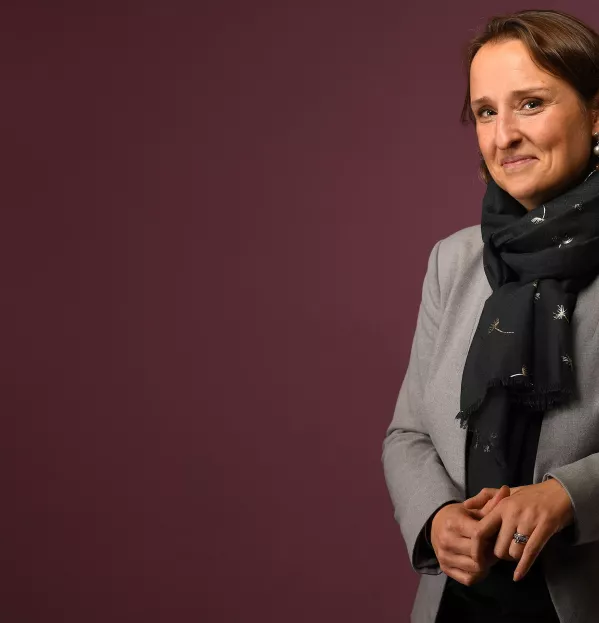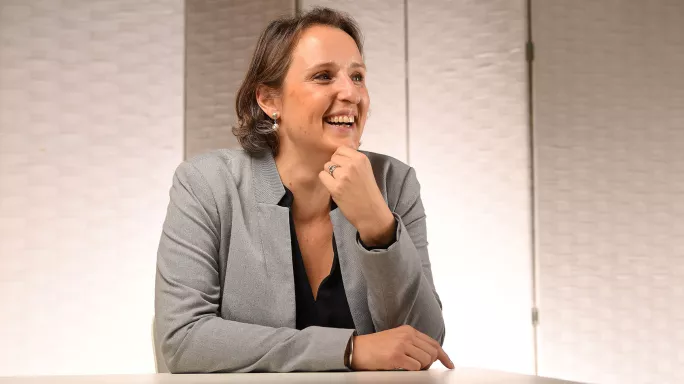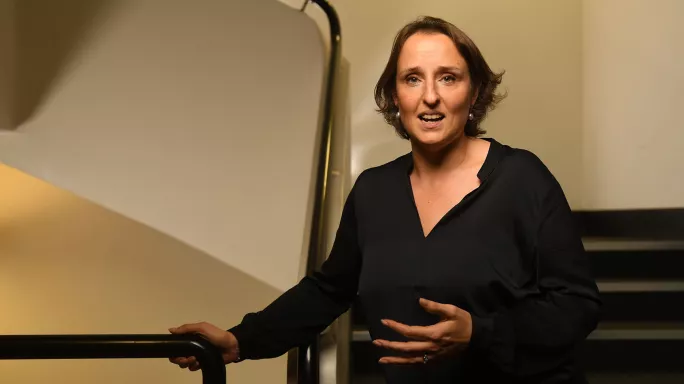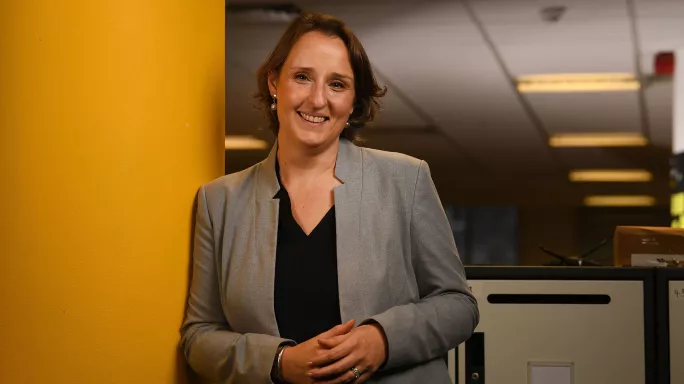10 questions with... Hilary Spencer

Hilary Spencer is the CEO of Ambition Institute, a charity that provides professional development to teachers and school leaders. Previously, she was the director of the Government Equalities Office.
Speaking to Tes for our 10 questions series, Spencer talks about the important lessons her school history teacher, Mrs Fingland, taught her and how she found herself in the world of policy.
1. Who was your most memorable teacher?
I was really lucky, I loved school and I had loads of teachers that I remember and I’m still very fond of. My most memorable teacher is Mrs Fingland, who was my secondary school history teacher. She had a big focus on the importance of knowledge and also different perspectives.
I remember her being quite deliberate about saying: “This is what we’re told about these things, but what about looking at it from this perspective.” That focus on trying to understand different opinions and views, and how you make a balanced assessment of it, is something that’s stayed with me.
2. What were the best and worst things about your time in school?
I really loved school and the sense that it was a place with loads of opportunities and possibilities to do different things. I think the flip side of that was also slightly the worst thing. It was quite an intense environment and everyone put quite a lot of pressure on themselves to get really good grades.
I think there definitely were people around me that felt that pressure quite acutely and it tipped over into mental health issues or eating challenges. I think there’s a sense of, can you get the balance between something that’s really fulfilling with loads of opportunities where you can do loads of things, and work out how you balance it in a way that you don’t run yourself into the ground.
3. Why do you work in education?
I thought I might want to be a teacher because I enjoyed school so much. I went to teach in China and I taught English in a school for 16- to 18-year-olds that was attached to a hotel.
I worked out that, in the same town, there was one school where they were training the kids to go to university and there was another training them to run farms and be in agriculture. So at some point, someone had decided these kids, aged 14, that this was going to be their path in life.
That got me thinking quite a lot about the system: how and when do you make decisions about that? I guess I’ve always experienced education as a liberating force, but there was this idea that actually it could also be a constraining force in terms of the way it’s used.
I then went to work in South Africa post-apartheid, and again there was the sense that while education should be a force of liberation, it was being used to stratify and intensify inequalities.
I feel very strongly that it shouldn’t be luck or fortune that gives you access to a good education, and that’s what got me interested in working in the education field. Education policy and how you create the conditions where people can achieve their potential has been a real motivating force for me.
That’s what took me into the world of policy to start with.

4. What are you proudest of in your career and is there anything that you regret?
At the Government Equalities Office, we introduced gender pay gap reporting. There was potential for it to change quite a lot of things for the better. And I think the reasons I’m proud of it is because of its potential long-term impact, but also the teamwork that was involved. We did a lot of good work on that and then executed it really effectively, and so for me, there’s that real sense of shared achievement - and the idea that you’d put something into the system that can have a long-term effect over a couple of generations felt really exciting.
I don’t have any major regrets in career terms. I’ve been really lucky to work with lots of amazing people and to have the opportunity to have an impact in different ways. You always learn more about yourself under pressure. I remember when I first went back to work after having had my first baby, thinking you have to work in a really different way - and thinking five years [ago], I probably didn’t understand that about people I was working with.
5. What would you say are the best and worst aspects of our current school system?
I think the best aspects are the dedication and commitment of our workforce. We are hugely lucky and we’ve seen so much of that through the pandemic, in particular. We’ve always known that teachers are committed and dedicated, but the lengths that people went to through the pandemic to learn new ways of teaching to support their communities are incredible.
And I think also the increasing appetite for evidence-informed practice and the desire for professional development feel like the really powerful aspects of the school system at the moment.
I think probably the worst aspects are quite acute right now, where schools are often the providers of last resort. Schools are - with that dedication and commitment - putting themselves under quite a lot of pressure to solve those problems. I think it puts huge pressure on teachers and school leaders who absolutely want to do the best for the kids that they’re serving. But I think it creates challenges around burnout and retention, and potentially recruitment.

6. Your own teachers aside, who in education has influenced you the most?
I don’t think they’ll like me saying this: my time when I was involved in Oasis Academy South Bank. We started with seven staff and only 120 kids. The staff there were just completely amazing and the headteacher in particular, Carly Mitchell, I think has hugely influenced my view of what’s possible and I have nothing but huge admiration and respect for her and the team.
7. If you became education secretary tomorrow, what would be the first thing that you do?
I would put in place a full and properly-funded five-year pay plan for teachers and school leaders, with allocated time for professional development. I just think people are the most important aspect of our education system.
As I’ve said before, we’ve got hugely committed and capable people in the system. We need to make sure that they feel supported and rewarded, that there’s a longer-term future for them in action, and that they’re invested in and really valued to do a really excellent job. So that would be my first port of call.
8. What will our schools be like in 30 years?
It’s quite exciting to think about. I think some of the fundamentals will remain the same. The stuff about good teaching and good relationships, about that sense of community and the rounded aspects of education, will hopefully remain in place.
I hope we’ve got a more interesting use of tech. There’s incredible stuff you can do with technology and I think realising more of the potential of that could be really powerful. Hopefully, schools will be integrated more consistently with other services that children need…I’d hope that we can find a way for those sorts of services all working really seamlessly together to provide support for children.

9. Who has made the biggest difference in education in the past 12 months?
We’re in such a peculiar period of change and a bit of flux. I would find it easier to answer in terms of what intervention or policy has made the biggest difference, and for me and that would be the Early Careers Framework (ECF) because there are lots of people involved in that.
I think the ECF as an intervention in the system, which gets people at that early stage of their career and gives them a structured programme of development, intentional support and mentoring, is the thing that has made the biggest difference in education in the last 12 months - and hopefully has the possibility to make that continued impact and continued difference in the system.
10. What are the most important lessons you’ve learned in the job?
In this job, leading through a pandemic, I think all of us have been on fairly steep learning curves trying to work out what that looks like, and for me, there’s a sense of understanding your role in people’s lives in an uncertain world. Related to that, in this role, keeping focused on the core mission. Circumstances change, but fundamentally our mission is the same.
On things I’m proud of, or the people who’ve most shaped my thinking about education, there is obviously a huge amount of that from my three years to date at Ambition. I think the experts we have here, who have such a huge passion for learning and bring such rigour and commitment to the work we do, are inspiring every day. I feel like I personally have learned a lot from them, and that many of them have contributed strongly to the system and to education thinking more widely.
Register with Tes and you can read two free articles every month plus you'll have access to our range of award-winning newsletters.
Keep reading with our special offer!
You’ve reached your limit of free articles this month.
- Unlimited access to all Tes magazine content
- Save your favourite articles and gift them to your colleagues
- Exclusive subscriber-only stories
- Over 200,000 archived articles
- Unlimited access to all Tes magazine content
- Save your favourite articles and gift them to your colleagues
- Exclusive subscriber-only stories
- Over 200,000 archived articles
topics in this article



